Snapshot for March 26, 2003.
Globalization disarms developing nations
In the United States, we expect economic policymakers to actively combat recessions; citizens in developing nations deserve no less. Unfortunately, the current “rules of the game” governing economic globalization often do not allow this. For example, from December 2000 to November 2002, the official unemployment rate in the United States rose from 3.9% to 5.9 %, while in Brazil it rose from 5.6% to 7.8%. Although these measures are not directly comparable (among other reasons, Brazil’s official rate significantly understates true unemployment by only measuring the formal sector), the trends clearly indicate two stagnating economies. The way each government was able to respond to this underscores the fact that globalization leaves many developing nations defenseless against the business cycle.

As unemployment rose in the U.S., the Federal Reserve lowered interest rates. This lessened the severity of the recession. But as unemployment rose in Brazil, the Central Bank of Brazil raised interest rates. Brazil’s interest rate hikes do not stem from ignorance of how to fight business cycles. Rather, the dictates of foreign exchange markets necessitated the increase: lower interest rates might have spurred a financial crisis as investors looked for foreign currencies offering higher returns. Capital controls (regulations on foreign investment funds) might have ameliorated this crisis; however, such controls were ruled out-of-bounds by the International Monetary Fund (IMF). Many other developing nations have similarly relinquished their economic policies, leaving them disarmed against the vagaries of the business cycle.
This week’s Snapshot by EPI economist Josh Bivens.
Check out the archive for past Economic Snapshots.
